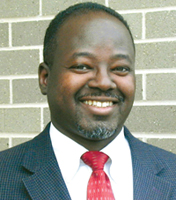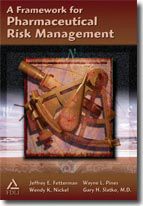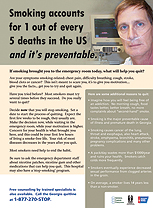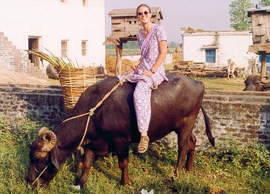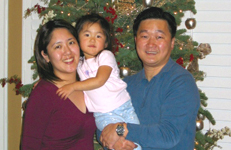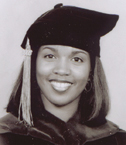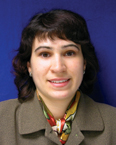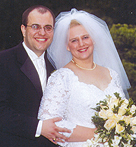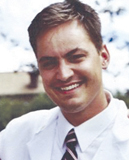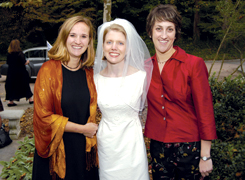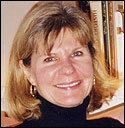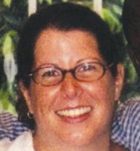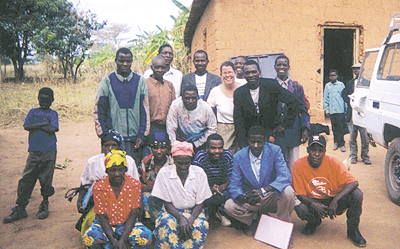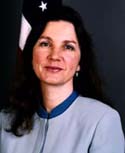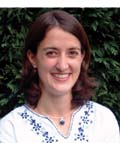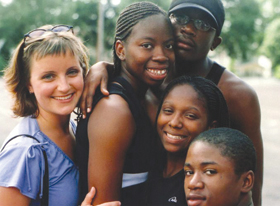Class Notes 1980s Erica Frank, MD, 84MPH, was recognized by Congressman John Lewis as a Local Legend from Georgia. This honor is bestowed on women physicians who have demonstrated commitment, originality, innovation, or creativity in their field of medicine. Frank is director of the Preventive Medicine Residency Program at Emory. She also is the education coordinator for the WHO Health InterNetwork. Michael O. Ugwueke, 86MPH, is regional vice president for strategy and business development for Provena Health, an integrated healthcare system based in Illinois, with six hospitals and several nursing homes. 1990s
Jacqueline D. Harris, 95MPH, is completing a postbaccalaureate program for nontraditional students called MEDPREP (Medical Education & Dentistry Preparatory Program), sponsored by Southern Illinois University School of Medicine in Carbondale, Ill. She and her husband, Welton, make their permanent home in Fayetteville, Ga. Amri Johnson, 96MPH, is CEO of Georgia Healthworks, an online healthcare job board launched in September 2003 for health care professionals seeking work in Georgia. In December, Johnson and three other Atlanta business owners appeared on NBC Nightly News to discuss the current and future state of their field. Martin Mugo Muita, 96MPH is working with CARE International Canada in Harare, Zimbabwe, in health sector coordination. Muita left the CARE USA Atlanta headquarters to “face the challenges of building the health care sector for CARE in Zimbabwe, which is only at 2% of the total portfolio.” Born To: Meridith Rentz, 97MPH, and husband, Dean Baker, a second son, Keller Mitchell, on Sept. 25, 2003. His brother, Mills Thomas, is two years older. Rentz works for Emory Healthcare as an executive administrator for the School of Medicine’s Department of Medicine. The family lives in Atlanta. Ifeoma (Iffy) Stella Izuchukwu, MD, 97MPH, is working at the Veteran Affairs Medical Center in West Los Angeles. She also has a faculty appointment at UCLA and will teach a course in their school of public health next fall. Currently she is teaching a residency series on evidence-based medicine.
Brian Midkiff, MD, 99MPH, received his medical degree on June 6, 2003 from Chicago Medical School. Midkiff is a radiology resident at Brown University, Rhode Island Hospital in Providence––his first choice in the national match. Kimberly Dionne Posey, MD, 99MPH, graduated from Wayne State University School of Medicine in Detroit, Mich. in June 2003.
2000s Born To: Joya Delgado Harris, 00MPH, and her husband, Karl, a son, Lawrence Karl, on October 30, 2002. The family lives in Atlanta where Joya Harris works in health education at the American Red Cross. Yelena Khromova, MD, 00MPH, is an Epidemic Intelligence Service Officer in CDC’s class of 2002. She works in the Immunization Safety Branch with the U.S. Vaccine Adverse Event Reporting System, particularly on safety issues of yellow fever vaccine, oculo-respiratory syndrome after influenza vaccine, and cardiac events following live viral vaccinations. As part of her EIS training, she assisted with the SARS response in spring 2003 by working with physicians who reported suspected cases as well as state health departments. Michael Martin, 00MPH, is chief of the HIV Vaccine and Clinical Research Section of the CDC in Thailand. He is married to Rachel Rodriguez, and they have a two-year-old son, Felipe.
Diana S. Hadzibegovic, MD, 01MPH, is an intern with CDC’s Emergency Leaders Program, a new program developed by Health and Human Services. She lives in Atlanta with her husband, Mirza, and their daughter Hana, age 11.
Ashley Puleo, 02MPH, completed her CDC fellowship in health and safety in emergency response and became certified in Hazmat response at Georgia Tech. Puleo is now a dental student at the University of North Carolina at Chapel Hill. She is also Miss North Carolina USA and placed as second runner-up in the Miss USA Pageant in April in Los Angeles. Clark Andelin, 03MPH, is a first-year medical student at the University of Utah School of Medicine in Salt Lake City. Paul Howell, 03MPH, is a newly-hired contractor with the CDC, Division of Entomology. He will be working in the Malaria Research and Reference Reagent Resource Center. Howell is married to Christina T. Howell and has a one-year-old daughter, Olivia Claire. The family plans to relocate from Columbia, S.C., to Atlanta soon. Shannon L. Jones, 03MPH, is employed by the U.S. Public Health Services and is a safety and environmental health officer with the U.S. Coast Guard.Tamara Stewart, 03MPH, is a research assistant at McKing Consulting Corporation in Atlanta. She lives in Stone Mountain, Ga.
Deaths Clyde Edward Turner, Jr., 82MPH, of Decatur, Ga., died October 17, 2003 at age 59, as a result of an automobile accident. Employed by the State of Georgia Health Department, he worked with tuberculosis patients and was a community epidemiologist at the Fulton County Health Department. Known as Ed, he was an active member of the Religious Society of Friends in Decatur. He was preceded in death by his parents, Clyde E. Turner, Sr. and Mildred Webb Turner, of Decatur. Surviving are three uncles, an aunt, and numerous cousins, mostly living in Georgia.
The Healing Fields
One of her first assignments out of school was a job with the Peace Corps in Turkmenistan, where she helped doctors integrate the lessons of prevention into their interactions with patients. The Ministry of Health’s goal was to reduce reliance on curative medicine and place it on prevention, says Smith. The hope behind the program was that these prevention messages could pass from doctor to patient, then from patient to patient, spreading by word-of-mouth. She assembled quick games, songs, and simple lessons for the doctors to use to teach about heart disease, HIV, smoking cessation, spousal abuse, and vaccinations, to name a few. She also helped organized the first Family Medicine Training Conference in collaboration with two local non-governmental organizations. “One thing lacking was a forum for doctors and nurses to meet colleagues from around the country, to share ideas and problems, and to network,” Smith says. Despite resistance from the Ministry, the first locally-run, national Turkmen medical conference for 50 medicos from all five provinces took place in December 2001. By that time, Smith had been evacuated along with other volunteers from Turkmenistan, Uzbekistan, and Kazakhstan in the wake of September 11. Her next field assignment was to Camacupa, Angola, where Concern Worldwide, a small Irish group, needed an emergency health project manager. The area was transitioning to a long-term development program. Smith’s job was to hand a struggling “activista” program back to the internally-displaced community and to phase out curative services in light of the ending of the civil war. Her challenge was to reinvent a program from the bottom-up after an original top-down organization—all with basic language skills in Portuguese.At the end of that project, she moved to Kunhinga to open a community health-based program where none had existed previously. “In a time of peace, this was a fantastic opportunity to experiment, take the time to do a proper needs assessment, and look at mobilizing children towards disease prevention,” Smith says. “We started small, in three ‘aldeias’, with a total population of about 4,000. Within three months, 10 ‘activistas’ were recruited by their communities, who co-developed their own training programs, which continued to spread, much to the amazement of the local staff.” Smith next moved on to Ekunha to advise a struggling health project. The four-year-old program of 58 activistas was stagnating and the curative program was unwilling to transition out of an emergency phase. “Changes had to be made, with diplomacy taking a backseat to practicality,” Smith says. “Reducing handouts to the Ministry of Health, and forcing them to be accountable, knowing that patient care would be sacrificed for the good of long-term sustainability was the biggest challenge.” After a rapid needs assessment, Smith worked with the local activistas to develop, implement, train, and evaluate a basic community health program. Although social issues were closely linked to health, they had been long ignored in the community. The newly trained activistas remedied that through the formation of support groups and classes on child rearing and family planning, men’s sexual health, latrine construction, and sewing. “Trainings became far less about process, and far more about content,” she says.
Editor’s note: This article was based on an essay Smith wrote in February 2004 when she was searching for the next healing fields that needed her services.
(For more about her work, see related story.) Siklossy has made a significant impact in organizing specialized medical attention for adolescents in Cuenca, Ecuador, where she developed primary care and health education programs that are models used by CARE Ecuador throughout the country. Additionally in Atlanta, Siklossy has worked with the Latino community and other groups for which English is not a first language on sexual violence prevention. At the DeKalb Rape Crisis Center, she created the Multicultural Outreach Program and works directly with community members through churches, schools, beauty salons, and local radio stations. Moving to a non-violent beat Amy Estlund has discovered an effective method of violence prevention for young people: a bit of dancing and a lot of mentoring.
With its focus on training community leaders, Moving in the Spirit is effective in promoting healthy and positive students and preventing violence, Estlund found. One Moving in the Spirit alum summed it up like this: “Moving in the Spirit has definitely given me an edge in life. Without it, I would probably be in jail or dead.”Estlund’s positive evaluation, however, did reveal one missing element. Unlike similar successful organizations around the nation, Moving in the Spirit lacked a mentoring component. The organization remedied that gap in 2002 by adding a mentoring program to its services and hiring Estlund to direct it. She since has recruited 30 mentors, many of them RSPH alums or current students. These mentors support the dancers academically and provide positive role models and advice. For example, they might help with homework or accompany their mentee to performances. They meet with families and provide personal health education counseling. Last year, groups of mentors and their students participated in service projects to prepare meals for those who are HIV positive, and they took in shows at the Fox Theatre.
Disease Detective | Instamatic Informatics | Veteran Epidemiologist | The Human Strain Expelling the Fiery Serpent | Corps Class | Rollins School of Public Health
Copyright © Emory University, 2004. All Rights
Reserved. |

